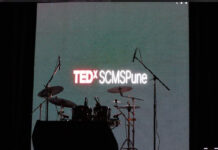This article was written by Riya Kuruvilla
If you were to ask me to recount my childhood, the most I could come up with would probably take lesser than ten minutes of your time. The memories of my childhood are so knotted and full of holes that the space it takes up in my mind is hardly explored, to forego the effort it would take. This effort seems to be what Neil Gaiman has embarked upon in “The Ocean at the End of the Lane” a 2013 novel, but trying to patch up an imaginary set of memories , using the settings of his English hometown as an inspiration.
The title encapsulates a theme much explored in the rest of the book, a hidden kind of magic under the veil of the normal. This is the sort of theme that makes you think back about your own childhood, when the bed you thought was extra king sized was in reality only a Queen, a secret hiding place that once was so magical but now only seems to be dull, if not awaking a little claustrophobia. This is what our protagonist seems to be feeling in the first few chapters of the book as he comes back to his hometown for a funeral, memories being reawakened. It refreshes the reader, allowing you the satisfaction that is not your own of remembering so vividly (in bits and pieces, then a whole) your childhood –“I saw it and felt oddly proud of myself, as if that one act of memory had blown away some of the cobwebs of the day.”
This is an adult category fantasy book and it fortunately (unfortunately others may say) isn’t exactly what it may imply (except for one little X rated scene, but that too told through frightened and confused seven year old’s eyes). Our protagonist’s name is never revealed throughout the book and that leaves you with the experience of living a story, a reaction very few other novelists are able to evoke out of readers. You experience those universal feelings characteristic of childhood- particularly related to knowing and not knowing; of basking in the protective and comfortable warmth of innocence and quaking in the vulnerability of knowing what you’d rather not, but must know, of innocence and a corrupted innocence. Lettie Hempstock is the childhood friend with whom you may have lost contact with, but held in your memories like a legend. The rest of the Hempstocks, a family you’d rather have than the one you’re currently bestowed with. Ursula Monkton is the childish adult (a fairly realistic phenomenon, frighteningly common to all our experiences), a paradox in itself, trying to create happiness through control and a false sense of importance. The universe in a bucket is a metaphor for childhood, of knowing everything all at once and being content with the world where you are. Where everything that is around you makes your universe, which to others may be extremely tiny – as tiny as a bucket. Gaiman makes our childhood fantasies literal and in an ingenuous way.
He skilfully and charmingly incorporates bits of English folklore, nursery rhymes and culture in the most authentic and so not cliched ways (quite an accomplishment). His language is simple and aids you in the remembrance of your childhood – this novel indeed has you looking back at your own and wondering what was missing, and if similar fantastic and horrifying things may have happened to you.



































